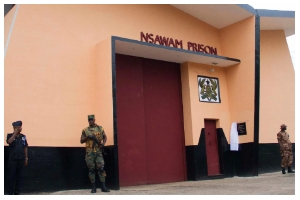Terrorism
Terrorists are likely to try to carry out attacks in Ghana. Attacks could be indiscriminate, including in places visited by foreigners. While there have been no recent attacks in Ghana, terrorist groups in west Africa have demonstrated their capability and intent by mounting attacks in 2015 and 2016 in Côte d’Ivoire, Burkina Faso and Mali, targeting beach resorts, hotels, cafes and restaurants visited by foreigners. You should be vigilant in these locations.
While Ghana has no recent history of terrorism, groups associated with al-Qaida in the Islamic Maghreb (AQIM), Islamic State of Libya and Islamic State West Africa (ISWA) present a threat to the wider region. In March 2016 Ghana’s National Security Council announced that Ghana were taking enhanced security measures in response to attacks elsewhere. It has continued to monitor the threat.
There’s a heightened threat of terrorist attack globally against UK interests and British nationals, from groups or individuals motivated by the conflict in Iraq and Syria. You should be vigilant at this time.
Find out more about the global threat from terrorism, how to minimise your risk and what to do in the event of a terrorist attack.
Local laws and customs
Ghana is a conservative and deeply religious country. Although modern and progressive attitudes also prevail, you should show respect for traditional values and morals.
Dress modestly in public.
Wearing military clothing including camouflage is prohibited.
Don’t become involved with drugs of any kind. Penalties for drug related offences are severe. Even possession of small amounts of marijuana can lead to a prison sentence in excess of 5 years, usually after a lengthy and expensive legal process. Bail is not normally granted. Class A drugs like cocaine are likely to be laced with other substances. Foreign visitors, including British nationals, have died after taking these drugs.
Carry a photocopy of your passport with you at all times, and put the original document in a safe.
Homosexuality is illegal. Although there is a small gay community, there is no ‘scene’ and most Ghanaians don’t accept that such activity exists.
Photography near sensitive sites like military installations or the airport is strictly prohibited. Ask permission if you want to take a photograph of a building where there are guards on duty. Beware of self-appointed officials trying to charge fees to take pictures of well-known sites of interest.
Ghanaian family law is very different from UK law, particularly when child custody becomes an issue.
Entry requirements
The information on this page covers the most common types of travel and reflects the UK government’s understanding of the rules currently in place. Unless otherwise stated, this information is for travellers using a full ‘British Citizen’ passport.
The authorities in the country or territory you’re travelling to are responsible for setting and enforcing the rules for entry. If you’re unclear about any aspect of the entry requirements, or you need further reassurance, you’ll need to contact the embassy, high commission or consulate of the country or territory you’re travelling to.
You should also consider checking with your transport provider or travel company to make sure your passport and other travel documents meet their requirements.
Visas
British passport holders need a visa to enter Ghana. For further information contact the Ghanaian High Commission in London. You should note the number of days the Ghanian immigration service will stamp into your passport upon arrival, irrespective of the validity of your visa.
Overstaying without the proper authority can lead to detention or refused permission to leave the country until a fine is paid.
Dual nationality
Ghana recognises dual nationality. To avoid visas fees, Ghanaian-British nationals should register with the Interior Ministry in Ghana and get a Dual Nationality card. Production of this card at point of entry into Ghana will indicate that a visa is not required.
Passport validity
Your passport should be valid for a minimum period of 6 months from the date of entry into Ghana.
UK Emergency Travel Documents
UK Emergency Travel Documents (ETDs) are not valid for entry or transit through Ghana. However, ETDs are accepted for exit from Ghana.
Yellow fever certificate requirements Check whether you need a yellow fever certificate by visiting the National Travel Health Network and Centre’s TravelHealthPro website.
Volunteering
If you are travelling to work in a volunteer programme or for work experience you should be fully aware of the terms and conditions of your stay and be sure that you will be working for a reputable organisation before you commit yourself to travel.
Residents
All foreign nationals who meet the eligibility criteria must register with the National Identification Authority (NIA) of Ghana and get a non-citizen Ghana card. This applies to:
foreign nationals permanently resident in the country foreign nationals resident in the country for at least 90 days in any calendar year all foreign nationals aged 6 years and above If you live in Ghana you should register with the National Identification Authority (NIA) of Ghana and get a non-citizen Ghana card. This applies to:
foreign nationals permanently resident in the country foreign nationals resident in the country for at least 90 days in any calendar year foreign nationals aged 6 years and above A non-citizen Ghana card is required to apply for a residence permit, for admission into educational institutions in Ghana, for all financial transactions including opening a bank account, payment of taxes, registration of sim cards, and applications for public or government services, facilities, approvals and permissions. You can complete this registration process at any one of the following places:
National Identification Authority Tetteh Quarshie Near Gulf House Accra Telephone: +233 (0) 302218080
Ghana Immigration Service (off Ako Adjei Overpass) Independence Avenue Accra Telephone: +233 (0) 302258250
VFS Global 9 Kakramada Road Cantonments Accra Telephone: +233 (0) 302746212
Some branches of CAL bank can also provide this service. You should ask your local CAL bank branch if they’re able to help you. Failure to procure the non-citizen Ghana card constitutes a criminal breach. For more information see the National Identification Authority website.
Health
Visit your health professional at least 4 to 6 weeks before your trip to check whether you need any vaccinations or other preventive measures. Country specific information and advice is published by the National Travel Health Network and Centre on the TravelHealthPro website and by NHS (Scotland) on the fitfortravel website. Useful information and advice about healthcare abroad is also available on the NHS Choices website.
Medical facilities are poor outside towns. For serious medical treatment, medical evacuation will be necessary. Make sure you have adequate travel health insurance and accessible funds to cover the cost of any medical treatment abroad and repatriation.
There are reports of a cholera outbreak in Accra. Some isolated cases of cholera have also been reported in northern Ghana. The Ghanaian Ministry of Health has reported an outbreak of pneumococcal meningitis with a total of 100 deaths. All regions have been affected apart from the central region of Ghana. See the Ministry’s website for more information.
General News of Thursday, 3 August 2017
Source: gov.uk

















